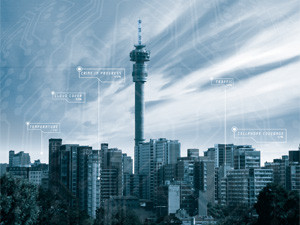
Johannesburg is set to receive a connectivity and technology injection in the near future, if promises made by executive mayor Mpho Parks Tau in his State of City Address today materialise.
The conclusion of outstanding issues around the controversial Johannesburg Broadband Network Project, high-speed broadband access in Braamfontein, significant improvements to education access and intelligent city security and traffic monitoring systems are all on the city's short-term agenda, according to Parks Tau.
The mayor says digital access is becoming as much an equity issue as access to water and electricity and indicated this morning that the city would be inching towards becoming a smart city in the near future.
"The broadband network we as a city have developed is a public asset. It allows us to reindustrialise in a way that builds Joburg as a city able to compete and lead in both the old industries that are rapidly digitising and in the new weightless economy of digital services."
Parks Tau said the city was "on the verge" of concluding a settlement agreement that would unlock this asset.
In Johannesburg's inner city suburb Braamfontein, where parts of the city's planned WiFi spots are already live, he said: "We are in the process of blanketing Braamfontein with WiFi that provides high-speed broadband access. This goes beyond hotspot access at specific buildings and demonstrates how public WiFi can work across a wide area."
Education focus
The WiFi "mesh" would become a showcase for how subsidised access to Internet means access to opportunity and education, he said.
"Only 13.2 % of Joburg residents across all age groups have a post-high school education. If you narrow that to those who have bachelor degrees or higher, the percentage drops to 5.8%."
"Massive open online courses" would create the opportunity for online university education, said Parks Tau, adding that this was a solution that is being offered by the city's libraries division.
"The Massive Open Online Varsity, or MOOV, will provide the kind of learning gateway that is making all the difference across Africa. The MOOV programme, which currently has 40 youth enrolled, will expand to connect hundreds of students citywide with recognised online courses offered by institutions as prestigious and diverse as Wharton Business School, Rice University, the University of Adelaide and the Massachusetts Institute of Technology."
Parks Tau said this complements the city's new range of programmes that "directly support the new digital economy", including the Tshimologong precinct (dedicated to digital start-ups) and the Hack.Jozi programme.
Smart city ambition
"We are innovating to transform how we run the city for the 21st Century," said Parks Tau. He said the city's new intelligent operations centre links - together with its upgraded CCTV cameras - "gives us eyes on the street".
He added that, through the city's partnership with Anglo-American, it had tested a new digital patient system that cuts waiting times from an average of 45 minutes to less than 10 minutes, at its clinic in Slovoville.
In terms of improving mobility and traffic flow in the city, Parks Tau said 75% of Johannesburg's traffic lights were now on a remote monitoring system. "This allows for early detection and automatic reporting of faults, providing for quicker response and repair times."
"Of course, being a smart city is not only about the clever use of technology. It's about using smart innovation to solve complex problems."
Share